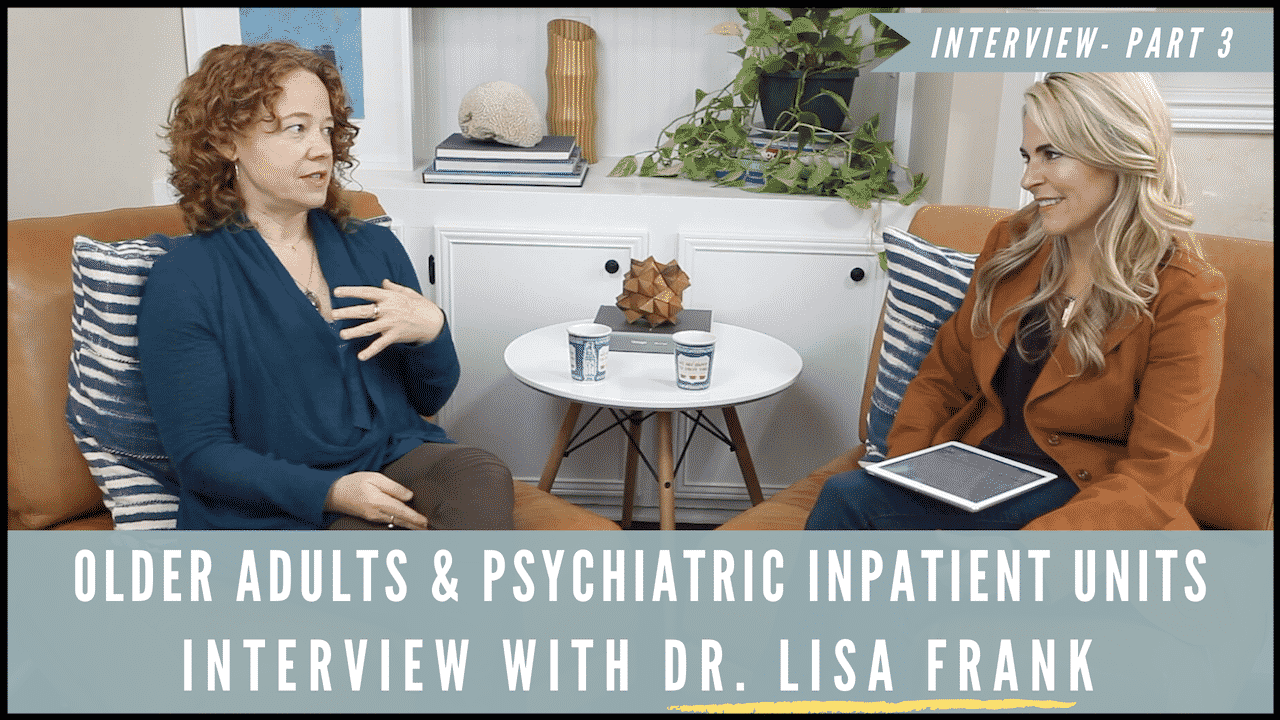Caring for an aging parent who has been hospitalized on a psychiatric inpatient unit is incredibly challenging.
Older adults who end up needing psychiatric inpatient care may have a longstanding mental health condition, a new mental health condition, a mental health condition with medical problems, like dementia, and countless other scenarios.
If it happens that your aging parent needs psychiatric hospitalization, not only are you likely to be scared and confused, so too is your aging parent. It’s incredibly upsetting to see our aging parents suffer. When we witness them struggle with mental health concerns and we see that they are suffering not only in their body, but in their psyche and their soul, it is incredibly painful thing to witness.
If you find yourself in this situation, I want you to know that you’re not alone. I’m here to help by sharing some information and resources.
This is exactly why I am devoting an episode to help you understand psychiatric inpatient units, what care looks like on a psychiatric inpatient unit, and how YOU can help your aging parent if they happen to need treatment on a psychiatric inpatient unit!
Today I have the privilege of interviewing Psychiatrist, Dr. Lisa Frank, who shares her insights into caring for older adults on psychiatric inpatient units. And she should know! She’s been the medical director for two psychiatric inpatient units!
Watch the interview now!
Lisa Frank, MD is a board certified psychiatrist with special interests in geriatric psychiatry, trauma, and mood disorders. Dr. Frank has practiced in a variety of clinical settings, including inpatient psychiatry units, partial hospitalization programs, and outpatient. She has served as Medical Director for two acute psychiatric inpatient units and is a former faculty member of both Morehouse School of Medicine and Emory University School of Medicine, both in Atlanta, GA. Dr. Frank currently works in a community mental health care setting.
Here’s a sneak peek at what you’ll learn from my interview with Dr. Lisa Frank:
- [03:11] Who is on the psychiatric inpatient team?
- [05:37] How to communicate with the psychiatric inpatient team when your aging parent is hospitalized
- [07:28] How to talk with the psychiatric inpatient team when your aging parent is refusing your involvement in their care
- [10:25] What does a day on a psychiatric inpatient unit look like?
- [12:41] Will my aging parent be safe on a psychiatric inpatient unit?
- [16:20] How to help your aging parent prepare for discharge
- [18:07] How to find geriatric psychiatrists near you.
Here are some tips for finding Geriatric Psychiatrists:
- Psychology Today– In this resource portal, you can search for Psychologists and Psychiatrists who specialize in older adults, simply select your age category (Elders 65+)
- Geriatric Mental Health Foundation– The doctors listed on their website are members of the American Association for Geriatric Psychiatry (AAGP).
- Major Medical Centers and Universities – If your aging parent lives near a major medical center or medical university, go online (or google them) to see if they offer mental health care for older adults. Here are some common terms to help you in your search: geriatric mental health, behavioral health for older adults, a geriatric psychiatry program, etc.
Get caught up on all three interviews with Dr. Lisa Frank:
- Dementia, Delirium, and When To Seek Medical Care. Interview with Dr. Lisa Frank- Part 1 (Ep #028)
- Hallucinations, Delusions, and Antipsychotic Medications. Interview with Dr. Lisa Frank- Part 2 (Ep #029)
Want to learn more about dementia?
Here’s an important freebie I made just for you, It’s called, Dementia 101: A Beginner’s Guide to Dementia Disorders. In it, I describe what dementia is and isn’t. I describe the phases of dementia and what to do if you’re worried that your aging parent may have dementia. So, take a moment to download it. It answers some of the most frequently asked questions I get about dementia!
Here are some episodes that can broaden your understanding of dementia and caring for someone with dementia as well!
- Dementia is NOT a Normal Part of Aging (Ep #024)
- Interview with MJ Grant (Part 1)- MJ Talks About Caring for Her Mom with Dementia (Ep #026)
That’s all for today! If you have friends who would benefit from this information, please share this video and article with them, because nobody should have to do this caregiving thing-alone.
Lots of love to you and your family.
Bye for now,
Dr. Regina Koepp




